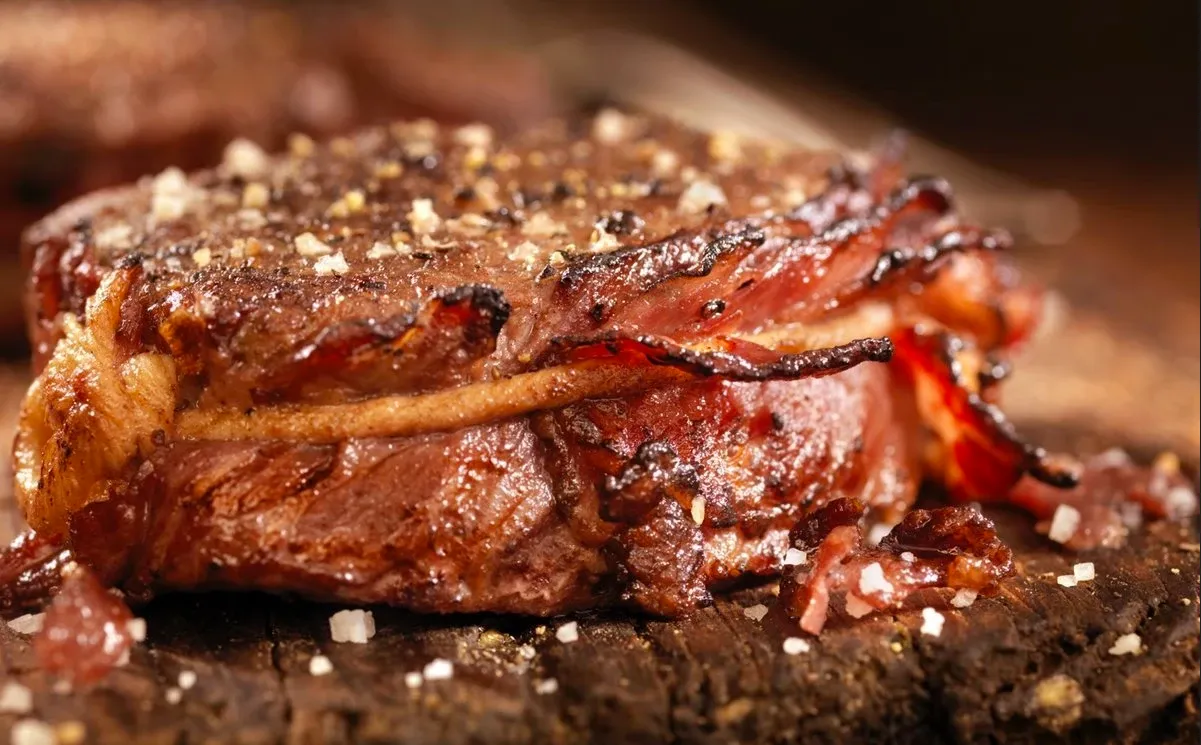Table of Contents
If we never ate the foods that were supposedly going to kill us, we’d never eat anything but mung beans and water. Except, wait: water toxemia is a thing, and mung beans not only interact with certain medications, but are at higher risk of carrying harmful bacteria.
Guess we better all become Breatharians, then.
Above all, though, nutritionists have been warning for decades, red meat is, like, really, really bad for you.
But nutritionists may be full of more bullshit than the original owner of that nice, juicy steak you’re eyeing.
Nearly all the research is observational, unable to tease out causation convincingly. Most are plagued by confounding variables. For example, perhaps meat eaters simply eat fewer vegetables, or tend to smoke more, or exercise less? Moreover, many are based on self-reported consumption. The simple fact is that people can’t remember what they eat with any accuracy. And lastly, the reported effect sizes in these scientific papers are often small. Is a supposed 15 per cent greater risk of cancer really worth worrying about?
If your risk of cancer is normal (ie low) then a 15 per cent greater risk isn’t a big deal. After all, the lifetime risk of cancer for the average person is about 15 per cent. Add another 15 per cent to that, and your risk skyrockets to… 17 per cent.
How very terrifying.
In a new, unprecedented effort, scientists at the University of Washington’s Institute for Health Metrics and Evaluation (IHME) scrutinized decades of research on red meat consumption and its links to various health outcomes, formulating a new rating system to communicate health risks in the process. Their findings mostly dispel any concerns about eating red meat.
“We found weak evidence of association between unprocessed red meat consumption and colorectal cancer, breast cancer, type two diabetes and ischemic heart disease. Moreover, we found no evidence of an association between unprocessed red meat and ischemic stroke or hemorrhagic stroke,” they summarized.
The problem, as is becoming an increasing embarrassment for much scientific research, is that shonky studies are simply taken at face value. Hardly anybody bothers trying to reproduce their results, and, in any case, by the time the study is debunked, the media have moved on to their next circus novelty.
The IHME scientists had been observing the shoddy nature of health science for decades. Each year, hundreds of frankly lazy studies are published that simply attempt to find an observational link between some action – eating a food for example – and a health outcome, like death or disease. In the end, owing to sloppy methods, varying subject populations and inconsistent statistical measures, everything, especially different foods, seems to be both associated and not associated with cancer.
To try and combat this barrage of allegedly scientific misinformation, researchers came up with a new system to establish risk.
The researchers came up with the burden of proof risk function, a novel statistical method to quantitatively “evaluate and summarize evidence of risk across different risk-outcome pairs.” Using the function, any researcher can evaluate published data for a certain health risk, then, using the function, compute a single number that translates to a one- through five-star rating system.
“A one-star rating indicates that there may be no true association between the behavior or condition and the health outcome. Two stars indicates the behavior or condition is at least associated with a 0-15 per cent change in the likelihood of a health outcome, while three stars indicates at least a 15-50 per cent change, four stars indicates at least a 50-85 per cent change, and five stars indicates a more than 85 per cent change.”
And how does red meat fare on this system?
When the IHME utilized this function on red meat consumption and its potential links to various adverse health outcomes, they found that none warranted greater than a two-star rating.
“The evidence for a direct vascular or health risk from eating meat regularly is very low, to the point that there is probably no risk,” commented Dr Steven Novella, a Yale neurologist and president of the New England Skeptical Society. “There is, however, more evidence for a health risk from eating too few vegetables. That is really the risk of a high-meat diet, those meat calories are displacing vegetable calories.”
Big Think
So, as Kinky Friedman would say, wipe its ass and bring to the table, and drag it through the garden on the way.
(Translation: steak, rare, with salad.)









